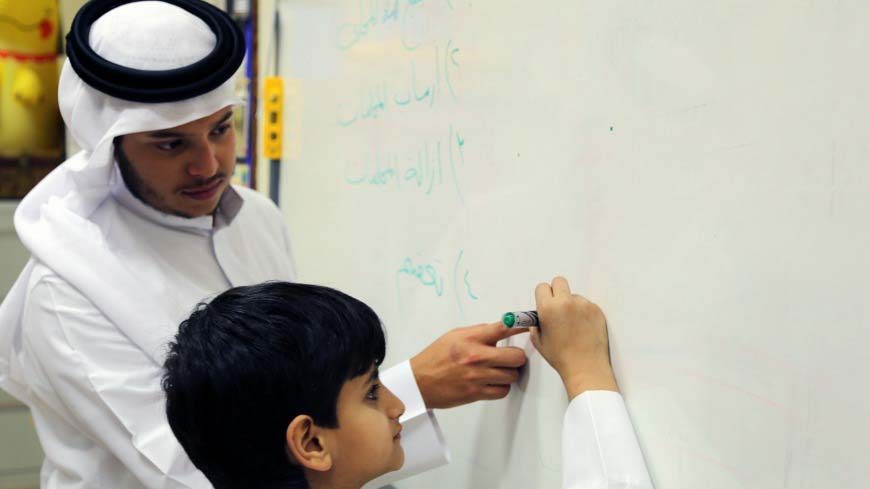
In an effort to boost performance among students in Qatar’s independent school system, the country has joined an international program that will train a new generation of educators to teach at these schools.
Last night, Qatar officially launched its membership into the Teach for All Network, in the presence of former first lady Sheikha Moza bint Nasser and Sheikha Hind bint Hamad Al Thani, who is heading the program.
On its website, Teach for All said Qatar plans to bridge the gap in the public education system here, as “students in Qatar are, on an average, three years behind (the Organization for Cooperation and Economic Development) standards.”
It continued:
“There is a disparity between the amount of resources invested in education and the output produced and a great discrepancy between the top performing (typically private) schools and the bottom performing, government-run schools.”
This gap was made evident last summer, when thousands of Qatari students failed their secondary exams. Parents expressed dismay after the Minister of Education and Higher Education refused to allow do-overs, saying there was no room for nepotism, favoritism or manipulation of the test results.
And in December, Qatar’s students once again ranked near the bottom of the Program for International Assessment (PISA) exam, an international education index.
However, though they ranked below average in the three main categories of math, reading and science, students also showed improvement since first being assessed in 2006.
Empowering youth
Under Teach for Qatar, selected recent college graduates and young working professionals from various backgrounds would be provided with training and mentorship. Those who qualify would be placed as full-time teachers in various independent schools in Qatar for two years.
During yesterday’s launch, Sheikha Hind Bint Hamad Al Thani said:
“Despite trials and progress made so far, we have a long way ahead. I call upon the youth to make the most of the opportunity to give back to their community.”
TFQ has also developed career pathways with other Qatari institutions through which the ‘fellows’ can continue to contribute to the Qatari education system upon completion of the two-year teaching program.
In the past, educators have said some of the biggest problems facing government-funded independent schools included a shortage of qualified educators and the great number of unruly children.
Thus, the initiative has been welcomed by the 10 local independent schools who have agreed to hire trained TFQ teachers.
Mohammed Fakhroo, TFQ’s chief executive, said that the schools – whose names have not been released – would work “hand-in-hand” with the NGO to promote the education system.
“We are proud of the growing collaboration between us and the independent schools that will be taking TFQ Fellows on board.”
Skepticism
However, not all have warmly welcomed the NGO.
On Twitter, some have been expressing doubts that such trainees could improve Qatar’s flailing public school system under the hashtag #علّم_لأجل_قطر (Teach for Qatar):
https://twitter.com/esra2qtr/status/440896417721110528
https://twitter.com/A_AlAthbah/status/441080574711566336
(Our children are not guinea pigs, SEC…)
The concerns expressed by some Qataris echo a larger debate about the mandate of Teach for All, and its success.
In the US for example, some have started to call for a reform of the program, to weed out potential teachers who are just looking to pad their resumes.
How to sign up
A recruitment drive will begin this week in Doha, with an early-bird deadline of March 24 and a final May 10 deadline.
Student centers at Hamad bin Khalifa University and Qatar University will have informational booths set up for students and young professionals to test their knowledge on core subjects, have a trial teaching experience and interact with TFQ members to apply for the fellowship.
The application prerequisites include fluency in Arabic and English and cumulative undergraduate grade point average of 3.0 on a 4.0 scale. Those who wish to teach must have graduated by May 2014, and working professionals should not have more than four years of experience.
More details can be found on TFQ’s website here.
Thoughts?







